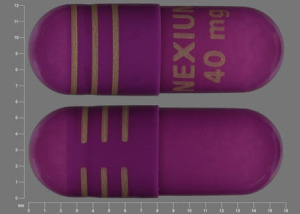Nexium and Alcohol/Food Interactions
There is 1 alcohol/food/lifestyle interaction with Nexium (esomeprazole).
Esomeprazole Food/Lifestyle
Moderate Food Interaction
ADJUST DOSING INTERVAL: Food may interfere with the absorption of esomeprazole. The manufacturer reports that the area under the concentration-time curve for esomeprazole following a single 40 mg dose was 33% to 53% lower when administered after food intake as opposed to during fasting conditions.
MANAGEMENT: Esomeprazole should be taken at least one hour before meals. When administered to patients receiving continuous enteral nutrition, some experts recommend that the tube feeding should be interrupted for at least 1 hour before and 1 hour after the dose of esomeprazole is given.
References (2)
- (2001) "Product Information. Nexium (esomeprazole)." Astra-Zeneca Pharmaceuticals
- Wohlt PD, Zheng L, Gunderson S, Balzar SA, Johnson BD, Fish JT (2009) "Recommendations for the use of medications with continuous enteral nutrition." Am J Health Syst Pharm, 66, p. 1438-67
Switch to consumer interaction data
Nexium drug interactions
There are 219 drug interactions with Nexium (esomeprazole).
Nexium disease interactions
There are 4 disease interactions with Nexium (esomeprazole) which include:
More about Nexium (esomeprazole)
- Nexium consumer information
- Check interactions
- Compare alternatives
- Pricing & coupons
- Reviews (212)
- Drug images
- Side effects
- Dosage information
- Patient tips
- During pregnancy
- Generic availability
- Support group
- Drug class: proton pump inhibitors
- Breastfeeding
- En español
Related treatment guides
Drug Interaction Classification
| Highly clinically significant. Avoid combinations; the risk of the interaction outweighs the benefit. | |
| Moderately clinically significant. Usually avoid combinations; use it only under special circumstances. | |
| Minimally clinically significant. Minimize risk; assess risk and consider an alternative drug, take steps to circumvent the interaction risk and/or institute a monitoring plan. | |
| No interaction information available. |
See also:
Further information
Always consult your healthcare provider to ensure the information displayed on this page applies to your personal circumstances.


